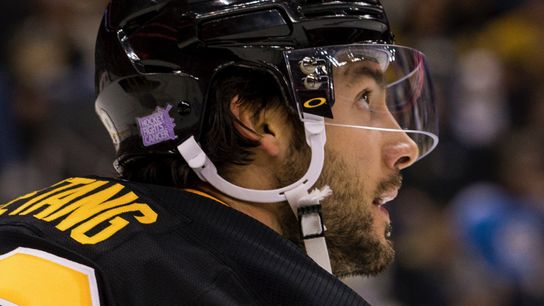If the NHL season had not been interrupted, and if the Metropolitan Division standings had not changed over the final weeks of the regular season -- sounds like quite a reach at this point, doesn't it? -- the Penguins now would be engaged in a first-round playoff series against the Flyers.
You know, the opponent that, over the years, has inspired more disdain on this side of the Commonwealth than any other since the teams entered the NHL in 1967.
The team of Bobby Clarke and Dave Schultz, of Derian Hatcher and Scott Hartnell.
The team, Kris Letang says, that is the Penguins' No. 2 -- no, that's not a typo -- rival these days.
Letang, speaking on a conference call Tuesday, acknowledged the long, often nasty history between the Penguins and Philadelphia, but suggested that Washington has bumped the Flyers from the top of his club's rivals list.
"I think the Flyers were more (intense) when we came into the league," he said. "We were all young ... and we got a taste of the Flyers-Penguins rivalry. But knowing that Sid (Crosby) and (Alex Ovechkin) were the two players who came into the league at almost the same time to take over, that helps the Caps-Pens rivalry. I would say that in the long run, Caps-Pens is the biggest one."
How many of his teammates share Letang's perspective is impossible to say, just as there's no way of predicting when the NHL will be back in operation. Play there has been suspended since March 12, and in the interim, countless scenarios have been considered for trying to salvage at least part of the 2019-20 season, even if it's only a revamped Stanley Cup tournament.
Precisely how the league would handle the playoffs -- if they happen at all -- figures to be largely determined by how long the shutdown lasts, but Letang said he thinks "it might take three weeks of playing and practicing to get back to speed" before games are played.
Even then, he added, teams that had been building momentum over the course of the season, or even just during the stretch drive, would be robbed of it because of the extended time off.
"Momentum won't carry for anyone," he said. "You could have a playoff series with the last(-place) team in the league and the top team, and you'll have a good series because there's no momentum carried."
Letang said he is trying to approach the shutdown the way he would a conventional off-season, but noted that in a typical summer, he begins to skate once or twice a week after taking about a week off following the Penguins' final game.
Because of social-distancing regulations, the only players allowed to be on skates now are those for whom it is part of an injury-rehabilitation regimen, like Blue Jackets defenseman Seth Jones.
What's more, players are not permitted to work out at team facilities and gyms have been closed because of the coronavirus pandemic, so staying in anything close to game shape is a major challenge. The only consolation might be that no individual or team figures to be at a competitive disadvantage if/when the season resumes.
"Everybody is going to be on the same level," Letang said. "What's hard is that we don't have access to gyms or, even if you would have a place to skate, you don't have access to (it). You're left with whatever you have at your house, or whatever you do outdoors. ... You won't see a difference between teams because everybody is in the same boat."
Letang and his wife have been splitting home-schooling duties for their seven-year-old son, Alex, and Letang said that the extra time he's had with his family during the shutdown has been a plus.
He also appreciates that the impact of the pandemic goes far beyond the disruption it has caused in the NHL.
"It's tough, but at the end of the day, there's more to that," Letang said. "The health of people is so much more important. It actually puts everything in perspective.
"I've kind of blocked the will to play hockey right now and just try to worry about what people are actually going through and what the real difficulties are."

